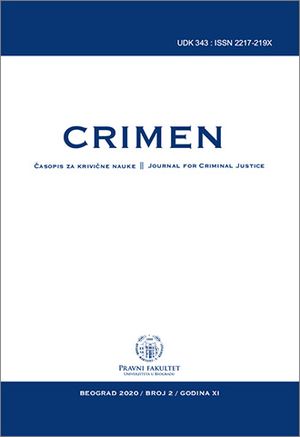IN REM CONTRA CULPAM?– PROŠIRENO ODUZIMANJE IMOVINSKE KORISTI U MEĐUNARODNOM I BOSANSKOHERCEGOVAČKOM KRIVIČNOM PRAVU
IN REM CONTRA CULPAM?- EXTENDED ASSET CONFISCATION IN INTERNATIONAL AND BOSNIAN AND HERZEGOVINIAN CRIMINAL LAW
Author(s): Darko Datzer, Eldan MujanovićSubject(s): Law, Constitution, Jurisprudence, Commercial Law, Court case
Published by: Правни факултет Универзитета у Београду
Keywords: extended criminal confiscation; illicit origin of assets; due process;
Summary/Abstract: It comes as no surprise that vast economic benefit is obtained through crime and that all necessary measures need to be taken in order to appropriate those ill-gotten gains. Deprivation of criminal assets assures effective prevention of their use in future criminal activities, simultaneously advancing the principle that crime does not pay. One of the fastest developing forms of deprivation is extended criminal confiscation, which is understood as recovery of property deriving from vague, assumed criminal activity. An important role in shaping the regime of extended criminal confiscation has been played by international and supranational organisations, hence the paper includes the analysis of relevant stipulations in five capital international documents, and, having in mind recent vivid legislative activities in Bosnia and Herzegovina, analysis of material criminal law norms in its four jurisdictions as well. Analysis includes discussion on a) the scope of crimes liable to extended confiscation, b) circumstances that could indicate on the criminal origin of the property, c) forms of procedural safeguards that are granted to confiscation subjects. International legal standards stipulate the option to utilize statutory legal presumptions and automatic reversal of the onus of proof, or circumstantial proof of illicit origin of assets and balanced onus. Both alternatives are present in Bosnia and Herzegovina, although none often used in practice. This unfavourable picture can be argued by inadequate elaboration of certain elements of the construct and, in some jurisdictions, restrictive approach in determining triggering offences. Improvement of normative framework, along with the other practical, organisational and other activities, is essential to fully utilize criminal policy potential this form of confiscation has.
Journal: CRIMEN - časopis za krivične nauke
- Issue Year: XI/2020
- Issue No: 2
- Page Range: 145-164
- Page Count: 20
- Language: Serbian

